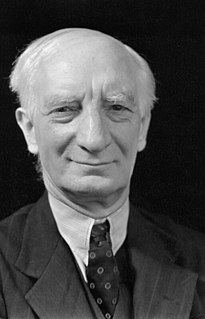A Quote by William Hazlitt
Our repugnance to death increases in proportion to our consciousness of having lived in vain.
Quote Topics
Related Quotes
The machine not only does it relieve us mechanically of a crushing weight of physical and mental labor; but by the miraculous enhancing of our senses, through its powers of enlargement, penetration and exact measurement, it constantly increases the scope and clarity of our perceptions. It fulfills the dream of all living creatures by satisfying our instinctive craving for the maximum of consciousness with a minimum of effort! Having embarked upon so profitable a path, how can Mankind fail to pursue it?
I consider morals and aesthetics one and the same, for they cover only one impulse, one drive inherent in our consciousness - to bring our life and all our actions into a satisfactory relationship with the events of the world as our consciousness wants it to be, in harmony with our life and according to the laws of consciousness itself.
I believe consciousness is non-local and a big part of what we experience with near death and past lives. It's the consciousness that has come into us from other experiences and our consciousness that we remain aware of when we leave our bodies and they communicate with us through dreams, and even through drawings which I do a lot of work with myself.
Many quantum physics are realizing or hypothesizing that consciousness is not a byproduct of evolution as has been suggested. Or for that matter, an expression of our brains, although it expresses itself through our brains. But consciousness is the common ground of existence that ultimately differentiates into space, time, energy, information and matter. And the same consciousness is responsible for our thoughts, for our emotions and feelings, for our behaviors, for our personal relationships, for our social interactions, for the environments that we find ourselves in, and for our biology.
The dignity to be sought in death is the appreciation by others of what one has been in life,... that proceeds from a life well lived and from the acceptance of one's own death as a necessary process of nature.... It is also the recognition that the real event taking place at the end of our life is our death, not the attempts to prevent it.




































